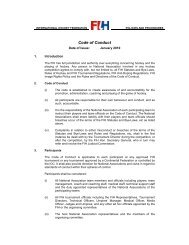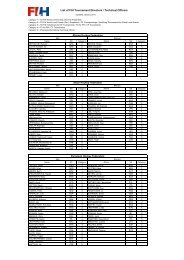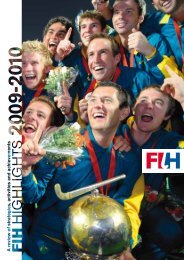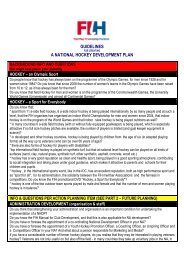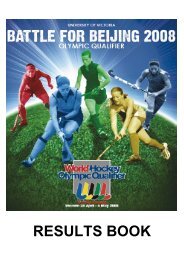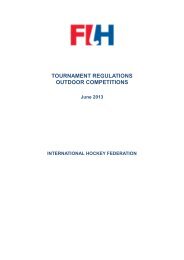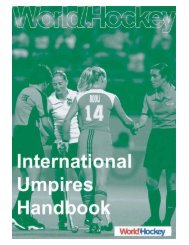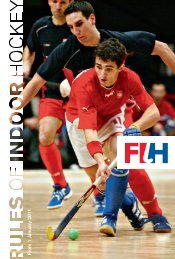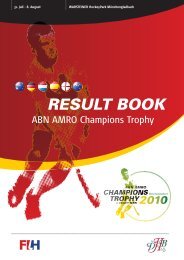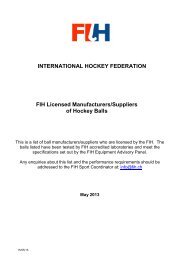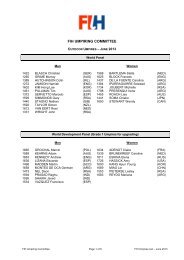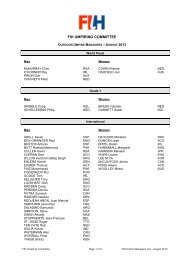FIH Statutes and Bylaws.pdf - International Hockey Federation
FIH Statutes and Bylaws.pdf - International Hockey Federation
FIH Statutes and Bylaws.pdf - International Hockey Federation
- No tags were found...
Create successful ePaper yourself
Turn your PDF publications into a flip-book with our unique Google optimized e-Paper software.
INTERNATIONAL HOCKEY FEDERATIONSTATUTESUPDATED 13 NOVEMBER, 2010TABLE OF CONTENTSARTICLE NO. SUBJECT PAGE NO.INDEX 21 NAME 32 OFFICIAL SEAT 33 INTERPRETATION 34 OBJECTS 45 POWERS 46 MEMBERSHIP 5-77 CONTINENTAL FEDERATIONS 78 CONGRESS 7-99 EXECUTIVE BOARD 10-1210 CHIEF EXECUTIVE OFFICER 1211 AUDIT OF ACCOUNTS 1212 RESOURCES 12-1313 JURISDICTION 13-1414 JUDICIAL COMMISSION 1415 SANCTIONS 14-1516 COURT OF ARBITRATION FOR SPORT 1517 PROCEDURAL FAIRNESS 1518 MODIFICATION 15-1619 DISSOLUTION 1620 INDEMNITY 16- 2 -
ARTICLE 1NAMEThe <strong>Federation</strong> shall be called the “<strong>International</strong> <strong>Hockey</strong> <strong>Federation</strong> (“<strong>FIH</strong>”)”.ARTICLE 2OFFICIAL SEATThe official seat of the <strong>FIH</strong> is Lausanne, Switzerl<strong>and</strong>.ARTICLE 3INTERPRETATION3.1 In these <strong>Statutes</strong>, the Bye-Laws <strong>and</strong> the Rules <strong>and</strong> Regulations, unless the context otherwise requires,the following words <strong>and</strong> expressions have the meanings set out opposite:AthleteAny player who takes part in any event approved <strong>and</strong>/or controlled by the <strong>FIH</strong><strong>and</strong>/or a CF.Bye-LawsThe Bye-Laws of the <strong>FIH</strong> made in accordance with the provisions of these<strong>Statutes</strong> <strong>and</strong> includes all amendments, alterations <strong>and</strong> re-enactments.CASThe Court of Arbitration for Sport in Lausanne, Switzerl<strong>and</strong>.CEO The Chief Executive Officer appointed by the Executive Board under Article 10.Congress The Congress of the <strong>FIH</strong> referred to in Article 8.Continental A hockey federation of a continent named in Article 7.9.<strong>Federation</strong> <strong>and</strong> CFCountryThe whole country, state, territory or part of a territory as recognized by the <strong>FIH</strong>in its absolute discretion to be the zone of judicial control of a NA <strong>and</strong> identicalto that of the NOC of the country as recognized by the IOC in so far as a NOCexists.JudicialThe commission established under Article 14.CommissionEventA hockey match, tournament or competition approved <strong>and</strong>/or controlled by the<strong>FIH</strong> <strong>and</strong>/or a CF.Executive Board The Executive Board established under Article 9.The <strong>Federation</strong> The <strong>International</strong> <strong>Hockey</strong> <strong>Federation</strong> hereby constituted.<strong>and</strong> <strong>FIH</strong><strong>Hockey</strong>The game of hockey including both field <strong>and</strong> indoor hockey.Honorary Secretary Any person appointed under Article 9.2(v).GeneralIOCThe <strong>International</strong> Olympic Committee.MemberA National Association accepted as a member of the <strong>FIH</strong> <strong>and</strong>, subject to Article6.1(c), includes an Adherent Member.NAA National Association or <strong>Federation</strong> of a country which is the recognizedcentral authority responsible for all matters relating to the administration,organisation <strong>and</strong> playing of <strong>Hockey</strong> in that country <strong>and</strong> recognized as such byits respective NOC.NOCThe National Olympic Committee of a country as recognized by the IOC.Proper Law The proper law of the <strong>FIH</strong> is Swiss Law.Simple Majority Majority of votes cast.Absolute Majority More than 1/2 of those present <strong>and</strong> entitled to vote.Special Majority More than 3/4 of those present <strong>and</strong> entitled to vote.Rules <strong>and</strong>Any rules or regulations made in accordance with these <strong>Statutes</strong> <strong>and</strong> includesRegulations all amendments, alterations <strong>and</strong> re-enactments thereof.3.2 These <strong>Statutes</strong> shall be written in both the French <strong>and</strong> English languages. In the event of anydifferences of interpretation, the English text shall prevail.3.3 For convenience <strong>and</strong> clarity the masculine gender is used <strong>and</strong> shall be interpreted to include thefeminine gender as appropriate.3.4 Words importing the singular shall include the plural <strong>and</strong> vice versa.See Bye-Law to Article 3- 3 -
ARTICLE 4OBJECTSThe objects of the <strong>FIH</strong> are to:4.1 Encourage, promote, develop <strong>and</strong> control hockey at all levels throughout the world;4.2 Support <strong>and</strong> maintain the ideals <strong>and</strong> objects of the Olympic movement <strong>and</strong> in particular the fightagainst doping;See Bye-Law to Article 4.24.3 Exercise jurisdiction over <strong>and</strong> to determine disputes or disagreements between Members, betweenCFs, between Members <strong>and</strong> CFs, between Athletes <strong>and</strong> <strong>FIH</strong> <strong>and</strong> between Athletes <strong>and</strong> a CF;4.4 Establish <strong>and</strong> maintain an efficient administration;4.5 Preserve the independence of the <strong>FIH</strong> in all matters directly or indirectly concerning <strong>Hockey</strong> without theintervention of any outside authority; <strong>and</strong>4.6 Conduct itself <strong>and</strong> take such administrative, financial or other actions as are necessary <strong>and</strong> inconformity with <strong>and</strong> in furtherance of its objects.ARTICLE 5POWERSIn furtherance of its objects the <strong>FIH</strong> may:5.1 Establish rules for <strong>Hockey</strong> <strong>and</strong> enforce them uniformly for all Events throughout the world;5.2 Define the rules governing eligibility for the game of hockey to be observed by all Members;See Bye-Law to Article 5.25.3 Raise funds for the activities of the <strong>FIH</strong> by all available means including from fees, levies <strong>and</strong>subscriptions, royalties, sponsorships <strong>and</strong> the licensing or assignment of commercial <strong>and</strong> other rights;5.4 Establish rules <strong>and</strong>/or regulations for the conduct of Events under the jurisdiction of the <strong>FIH</strong>;See Bye-Law to Article 5.45.5 Establish rules <strong>and</strong>/or regulations for the resolution of disputes, disagreements or misconduct withrespect to the affairs of the <strong>FIH</strong> <strong>and</strong> the game of <strong>Hockey</strong> <strong>and</strong> impose sanctions;See Bye-Law to Article 5.55.6 Establish Anti-Doping Regulations <strong>and</strong> the procedures for their implementation.5.7 Employ <strong>and</strong> pay <strong>and</strong> terminate the employment of any person or persons to supervise, organise <strong>and</strong>carry out the work of the <strong>FIH</strong>;5.8 Purchase, take on lease or in exchange or otherwise acquire any property or other rights <strong>and</strong> privilegesnecessary for the promotion of its objects <strong>and</strong> construct, maintain <strong>and</strong> alter any buildings or premisesnecessary for the work of the <strong>FIH</strong>;5.9 Sell, let, mortgage, dispose of or turn to account all or any of the property or assets of the <strong>FIH</strong>;5.10 Invest the funds of the <strong>FIH</strong> not immediately required in or on such investments, securities or propertyas may be thought fit by the Executive Board subject to any conditions as may for the time being beimposed by the Executive Board or required by law; <strong>and</strong>5.11 Take such lawful action as is necessary or desirable for the attainment of the objects of the <strong>FIH</strong>.- 4 -
ARTICLE 6MEMBERSHIP6.1 Requirements for Membership(a)(b)(c)(d)An NA of a country may be or remain affiliated to the <strong>FIH</strong> only if it governs <strong>Hockey</strong> for bothmen <strong>and</strong> women in that country.The activities of the Members of the <strong>FIH</strong> shall be solely <strong>and</strong> exclusively concerned with the<strong>Hockey</strong> in their own country but the Executive Board may make special <strong>and</strong> temporaryallowance in this regard in respect of new small NAs.In the case of a country where the creation of a NA is currently impractical the <strong>FIH</strong> may admitan organisation of that country as an Adherent Member. Adherent Members have no votingrights but in all other respects shall be regarded as Members.Every Member must declare:(i)(ii)Its opposition to any discrimination on the grounds of race, gender, politics, religion orcreed; <strong>and</strong>That it has the exclusive right to govern <strong>Hockey</strong> in its own country.(e)(f)NAs fulfilling the criteria for membership of the <strong>FIH</strong> may be provisionally admitted by theExecutive Board <strong>and</strong> formally admitted by the first Congress following application formembership.Membership of the <strong>FIH</strong> is conditional upon the applicant for membership being accepted as amember of the respective CF.6.2 <strong>Statutes</strong> Binding on MembersThe <strong>Statutes</strong>, Bye-laws, Rules, Regulations <strong>and</strong> decisions of the <strong>FIH</strong>, the Executive Board <strong>and</strong> anyduly appointed Committees of the <strong>FIH</strong> are binding upon all Members.6.3 Application for MembershipApplications for membership must be made to the Hon. Secretary General <strong>and</strong> must be accompaniedby following for consideration of membership:(a)(b)(c)(d)(e)(f)(g)The constitution of the NA;The names <strong>and</strong> addresses of its officers;The number of its individual members, a member being any person whatever gender or agewho is affiliated to the NA;An attestation, endorsement, <strong>and</strong> confirmation by its NOC that the NA has been accepted as amember of the NOC <strong>and</strong> is the central authority responsible for all matters relating to <strong>Hockey</strong> inthe country concerned. If a NOC has not yet been formed in the country, or if formed but notyet recognized by the IOC, the endorsement shall be given by the highest national authority insport. An NA automatically ceases to be a member of the <strong>FIH</strong> if it ceases to be a member of itsNOC;A declaration that they are opposed to any discrimination on the grounds of race, sex, politics,religion or creed;A copy of its anti-doping regulations which must be compliant with the <strong>FIH</strong> Anti-DopingRegulations <strong>and</strong> with the World Anti-Doping Code.A declaration that it has applied for membership of the relevant CF;- 5 -
(h)(i)A financial document (audited annual accounts) indicating that the NA is solvent;<strong>and</strong>A written guarantee to adhere to <strong>and</strong> abide by the <strong>Statutes</strong>, Bye Laws, Rules <strong>and</strong> Regulationsincluding Article 13 regarding the jurisdiction of the <strong>FIH</strong>.6.4 Subscriptions(a)(b)Members shall pay such subscriptions as are decided by the Congress.Without prejudice to Article 6.5(b) any NA whose subscription or any other money due <strong>and</strong>owing to the <strong>FIH</strong> is outst<strong>and</strong>ing <strong>and</strong> unpaid shall not be entitled to take part in the Congress.See Bye-Law to Article 6.46.5 Suspension/Expulsion(a)(b)(c)(d)(e)(f)(g)Upon the proposal of the Executive Board, the Congress may suspend or expel any NA owingmore than two annual subscriptions. Any NA which has been expelled <strong>and</strong> which is readmittedto membership must pay all arrears up to the date of expulsion.Unless it settles its outst<strong>and</strong>ing debts at least three (3) months beforeh<strong>and</strong>, no teamrepresenting that Member may participate in any Event without the approval of the ExecutiveBoard.The Executive Board may at any time by resolution of which proper notice has been given <strong>and</strong>by a Special Majority suspend a Member for conduct which is inconsistent with itsresponsibilities as a Member subject to such suspension being ratified by a Special Majority ofthe Members voting at the next Congress, which may also decide to expel the Member. TheMember shall be given the opportunity to be heard by the Congress.When a NOC is suspended by the IOC, the <strong>FIH</strong> undertakes on a request by the IOC tosuspend its corresponding NA <strong>and</strong> to forbid all other NAs from having any contact with thesuspended NA.When the running or the composition of a NA is arbitrarily modified by the decision of a bodyfrom outside the Olympic Movement this NA may be suspended from the <strong>FIH</strong> which in turnmay request the IOC to suspend the corresponding NOC.The suspension from the <strong>FIH</strong> referred to in paragraphs (d) <strong>and</strong> (e) shall be decided by theExecutive Board subject to ratification by the next Congress.Expulsion, withdrawal or suspension of any Member from the <strong>FIH</strong> will mean simultaneousexpulsion, withdrawal or suspension from the corresponding CF <strong>and</strong> vice versa.6.6 WithdrawalAny Member may withdraw from the <strong>FIH</strong> at the end of any calendar year provided it has given at leastsix (6) months’ notice in writing to the <strong>FIH</strong> <strong>and</strong> settles all outst<strong>and</strong>ing dues, fees, levies <strong>and</strong> othermonies payable to the <strong>FIH</strong>.6.7 Transfer(a)(b)(c)Membership is not transferable.If a Member ceases to be qualified to remain a member or is dissolved, ceases to exist orsuspends operations <strong>and</strong> another body is created or comes into existence in place of thatMember which satisfies the provisions of Articles 6.1 <strong>and</strong> 6.3, that other body may makeapplication to become a Member.On receipt of an application under paragraph (b), the Hon. Secretary General must notify theMember of the application <strong>and</strong> if the Member disputes the validity of such application it may by- 6 -
(d)(e)notice given to the <strong>Federation</strong> within forty-five (45) days of receiving such notification appeal tothe JC against the granting of the application.Subject to any appeal under paragraph (c), the Executive Board may provisionally admit theapplicant to membership in place of the Member <strong>and</strong> the applicant may be formally admitted tomembership by the first Congress following the application for membership.There shall be no right of appeal to CAS from any decision of the JC, Executive Board orCongress in relation to any application under this clause.6.8 Rights of Provisional MembersProvisional Members are entitled to all the benefits of membership <strong>and</strong> must fulfil all obligations of aMember. Provisional Members may attend <strong>and</strong> speak but not vote at any Congress.6.9 Register of Members(a)(b)ARTICLE 7The CEO must maintain a register of members recording the names of all members of the <strong>FIH</strong>together with such other details as the Executive Board or Congress may require from time totime.The CEO must make the Register of Members available for inspection on request by anyMember <strong>and</strong> by any member of the Executive Board.CONTINENTAL FEDERATIONS (“CF”)7.1 CFs may only be established pursuant to statutes approved by the <strong>FIH</strong>. The statutes of each CF arenot required to be identical. A CF may only change its statutes with the approval of the ExecutiveBoard of the <strong>FIH</strong>.7.2 Each CF derives its authority from the <strong>FIH</strong>.7.3 The <strong>Statutes</strong>, Bye-Laws, Rules & Regulations <strong>and</strong> decisions of the <strong>FIH</strong> <strong>and</strong> its Executive Board arebinding on the CFs.7.4 The jurisdiction of each CF is confined to the geographical area (Continent) as recognised by theAssociation of NOCs.7.5 Subject to the <strong>Statutes</strong>, Bye-Laws, Rules <strong>and</strong> Regulations of the <strong>FIH</strong>, in their respective Continentseach CF is responsible for:(a)(b)the administration, promotion <strong>and</strong> development of <strong>Hockey</strong> for men <strong>and</strong> women; <strong>and</strong>the organisation of tournaments, events <strong>and</strong> matches.7.6 Subject to the prior approval of the Executive Board of the <strong>FIH</strong>, CFs may make <strong>and</strong> change bye-laws,rules <strong>and</strong> regulations for the organisation <strong>and</strong> conduct of their activities.7.7 CFs may raise funds by way of:(a)(b)(c)levies from their members by way of subscriptions <strong>and</strong> fees;fees for tournaments, competitions <strong>and</strong> matches under their jurisdiction; <strong>and</strong>subject to Article 12.2, exploitation of commercial <strong>and</strong> other rights.7.8 Only NAs that are members of the <strong>FIH</strong> <strong>and</strong> are located within the Continent of the CF are eligible formembership of a CF.- 7 -
7.9 <strong>FIH</strong> recognises the following CFs:• African <strong>Hockey</strong> <strong>Federation</strong>.• Asian <strong>Hockey</strong> <strong>Federation</strong>.• European <strong>Hockey</strong> <strong>Federation</strong>.• Oceania <strong>Hockey</strong> <strong>Federation</strong>.• Pan American <strong>Hockey</strong> <strong>Federation</strong>.See Bye-Law to Article 7ARTICLE 8CONGRESS8.1 The Congress is the ultimate authority governing the conduct of the <strong>FIH</strong>.8.2 Ordinary meetings of the Congress shall be held once in every two (2) years. The Congress shall beheld in Lausanne, unless otherwise decided by the Executive Board, at a place <strong>and</strong> on a datedetermined by the Executive Board not less than six (6) months in advance.8.3 Extraordinary meetings of the Congress shall be held in Lausanne, unless otherwise decided by theExecutive Board:-(a)when requested by a decision of the Executive Board;(b) within three (3) months of the receipt by the <strong>FIH</strong> of a requisition by not less than ten (10)Members;(c)(d)on the request of the President; orwithin three (3) months of the death, resignation or permanent incapacity of the President.8.4 Not less than two (2) months’ notice shall be given to convene a meeting of the Congress <strong>and</strong> suchnotice shall specify the place, day <strong>and</strong> time of the meeting <strong>and</strong> the nature of the business to betransacted at such meeting.8.5 The Congress shall be composed of:(a)(b)(c)(d)Up to three (3) delegates from each NA, one of whom shall be the Head of the delegation to benamed at the opening of the meeting. The Head of the delegation must be a citizen of thecountry of the NA he represents. A delegate may speak either in French or English.Members of the Executive Board who may attend in their own right but with no voting rights.The President or in his absence another duly appointed office bearer of each CF who mayattend <strong>and</strong> speak but may not move or second motions or vote.Non-accredited persons may attend Congress at the discretion of the President.8.6 The business of an Ordinary Congress shall be:-(a) Verification of credentials.(b) President’s address.(c) General Report.(d) Financial Report.(e) Auditor’s Report.(f) Approval of the accounts <strong>and</strong> discharge of the Executive Board.(g) Report of the President of the Judicial Commission.(h) Consideration of applications for membership.(i) Consideration of proposals of suspensions/expulsions/dissolutions.(j) Proposals for alteration of the <strong>Statutes</strong>.(k) Election of the President- 8 -
(l) Election of ordinary Members of the Executive Board.(m) Advice from the Executive Board of the appointment of the Chair of the Athletes Committee(n) Subscriptions.(o) Appointment of Auditor.(p) Appointment of the President of the Judicial Commission – see Article 14.1(a)(i).(q) Consideration <strong>and</strong> updating of the Strategic Plan.(r) Any other items of which proper notice has been given by the Executive Board.The order of business may be changed by the Chair of the Congress either before or during theCongress.8.7 The President shall preside over all meetings of Congress but he may request the meeting to appoint aChairman in his place. In the absence of the President, the Hon. Secretary General shall open theCongress <strong>and</strong> request the delegates to appoint another member of the Executive Board (other than theCEO) to take the Chair.8.8 The quorum at a meeting of the Congress shall be one third (1/3) of the total membership of the <strong>FIH</strong>.8.9 Each NA shall be entitled to one (1) vote. Votes shall be registered by the Head of the delegation whomay only vote on behalf of one (1) NA.8.10 VotingVoting at Congress shall be dealt with as follows:(a)(b)(c)(d)Alterations to the <strong>Statutes</strong> require a Special Majority.Election of the President <strong>and</strong> ordinary members of the Executive Board requires an AbsoluteMajority.Other decisions of Congress require a Simple Majority.Any proposal receiving an equal number of votes shall be deemed to have failed.8.11 ElectionsElections at Congress shall be dealt with as follows, subject to compliance with Article 9.2(e):(a)(b)A President.Ordinary members of the Executive Board.Each c<strong>and</strong>idate is entitled to a one minute presentation. A summary/CV of each c<strong>and</strong>idate seekingelection shall be circulated to all delegates by the <strong>FIH</strong> if this is received in time.8.12 Balloting(a)(b)On the first ballot, each affiliated NA shall cast a vote for each vacancy <strong>and</strong> the c<strong>and</strong>idate(s)who receive an Absolute Majority shall be elected.If any vacancy still remains there shall be a second <strong>and</strong> subsequent ballots until all vacancieshave been filled <strong>and</strong> in each such ballot the number of remaining c<strong>and</strong>idates shall be reduced(if necessary) by removing those c<strong>and</strong>idates receiving the least number of votes so that thereare no more than twice the number of c<strong>and</strong>idates as there are remaining vacancies.- 9 -
ARTICLE 9EXECUTIVE BOARD9.1 Authority(a)(b)The Executive Board shall be responsible for directing the policy management <strong>and</strong> activities ofthe <strong>FIH</strong> <strong>and</strong> for ensuring the proper performance <strong>and</strong> observance of the objects of the<strong>Federation</strong> <strong>and</strong> its <strong>Statutes</strong>, Bye-Laws, Rules, Regulations <strong>and</strong> decisions.The Executive Board shall subject to the directions of the Congress have full power <strong>and</strong>authority to manage the affairs of the <strong>FIH</strong> <strong>and</strong> exercise all its powers including the power toemploy such persons <strong>and</strong> engage such agents as may be necessary for the performance of itsduties. In general, all matters not otherwise reserved to another body by these <strong>Statutes</strong> shallbe decided by the Executive Board.9.2 Composition(a)The Executive Board shall consist of:(i)(ii)(iii)(iv)(v)(vi)A President;8 Ordinary members;An Athletes Representative who must be appointed by the Executive Board prior to theOrdinary Congress;The Presidents of the Continental <strong>Federation</strong>s;An Honorary Secretary General appointed by the Executive Board at its first meetingafter Congress, subject to paragraph (j); <strong>and</strong>The CEO.See Bye-Law to Article 9.2(a)(iv)(b)(c)(d)(e)(f)(g)(h)The President shall preside over all meetings of the Executive Board but he may request themeeting to appoint a Chairman in his place. In the absence of the President, the Hon.Secretary General shall open the meeting <strong>and</strong> request the delegates to appoint anothermember of the Executive Board (other than the CEO) to take the Chair.All members of the Executive Board (except for the Presidents of the CFs) shall hold office intheir personal capacity <strong>and</strong> not as representatives of any NA or any other organisation.C<strong>and</strong>idates for election (or re-election as the case may be) as the President or as an Ordinarymember of the Executive Board must be nominated by their own NA <strong>and</strong> must be a citizen ofthat country.C<strong>and</strong>idatures must reach the CEO not later than ten (10) weeks before the date fixed for theordinary meeting of the Congress.Of the President, the Athletes Representative, the ordinary members <strong>and</strong> the Hon. SecretaryGeneral, at least four (4) must be female <strong>and</strong> at least four (4) must be male.The President holds office for a term of four (4) years expiring at the closure of the OrdinaryCongress at which the position falls vacant for election.The Ordinary members of the Executive Board hold office for a term of four (4) years (one halfretiring every two years) expiring at the closure of the Ordinary Congress at which their positionfalls vacant for election.- 10 -
(e)The Executive Board may honour Members or individuals of the <strong>FIH</strong> or personalities outsidethe <strong>FIH</strong> who have given long <strong>and</strong>/or outst<strong>and</strong>ing service to the <strong>FIH</strong> or <strong>Hockey</strong> by conferringone of the following awards:President of HonourOrder of MeritPresident’s AwardRenee.G.Frank Super Fair-Play Trophy*Theo Ykema Award*Member of HonourDiploma of MeritPablo Negre Trophy (every year)A.F. Lathouwers Memorial Plaquette*Etienne Glichitch Medal*9.4 Meetings*Every two (2) years.(a)(b)(c)(d)(e)The quorum at a meeting of the Executive Board shall be one third (1/3) of the totalmembership of the Executive Board.Each member of the Executive Board has one (1) vote.Unless otherwise provided, all questions arising at any meeting of the Executive Board shall bedecided by a Simple Majority. Any matter or proposal receiving equality of votes shall bedeemed to have failed.Approval of the Bye-laws, Rules <strong>and</strong> Regulations <strong>and</strong> any amendments, additions oralterations to them requires a Special Majority.The Executive Board shall meet at least three (3) times in each year at such times <strong>and</strong> placesas the President decides.9.5 Vacancies(a)(b)(c)ARTICLE 10If the President dies, resigns or becomes permanently incapacitated, the Executive Board shallappoint an Acting President to hold office until an Extraordinary meeting of the Congress whichmust be held within three (3) months for the purposes of appointing a person to fill the vacancy.The Acting President shall be entitled to all privileges <strong>and</strong> responsible for all duties of thePresident.Should a vacancy arise through the resignation, death or other cause of an Ordinary member,the seat shall remain vacant until the next Ordinary Congress.The Executive Board has the right to end the m<strong>and</strong>ate of any of its members who has beenabsent for two (2) consecutive meetings without valid reason <strong>and</strong> in such case the seat shallremain vacant until the next Ordinary Congress.CHIEF EXECUTIVE OFFICERThe Executive Board may appoint a Chief Executive Officer (“CEO”) on such terms <strong>and</strong> conditions as toremuneration, period of employment <strong>and</strong> termination thereof <strong>and</strong> duties as the Executive Board deems fit.ARTICLE 11AUDIT OF ACCOUNTSEach Ordinary Congress must appoint an internationally active auditing firm having a representation inSwitzerl<strong>and</strong> to audit the accounts of the <strong>FIH</strong> for the ensuing two (2) years.ARTICLE 12RESOURCES12.1 The <strong>FIH</strong> shall receive subscriptions in accordance with a scale proposed by the Executive Board <strong>and</strong>adopted by the Ordinary Congress. The <strong>FIH</strong> may also receive donations, gifts <strong>and</strong> bequests.12.2 The <strong>FIH</strong> is the sole owner of the television <strong>and</strong> radio rights <strong>and</strong> of all other commercial rights relating tointernational events, as defined by the Executive Board. It may, within the framework of its non- 12 -
(iv)any other person or body with whom the <strong>FIH</strong> has any association.(b)ARTICLE 14In the event that a person or body challenges the provisions of the <strong>Statutes</strong>, Bye-Laws, Rules,Regulations <strong>and</strong> decisions, the Executive Board may exclude that person or body fromparticipating in Events as long as the dispute is pending before the competent JurisdictionalBody or by CAS, as the case may be.JUDICIAL COMMISSION (“JC”)14.1 Appointment(a)The JC is an independent commission of the <strong>FIH</strong> comprising:(i)(ii)A President appointed by the Ordinary Congress on the proposal of the Executive Board;<strong>and</strong>An Hon. Secretary <strong>and</strong> a panel of members appointed by the Executive Board.(b) The President, Hon. Secretary <strong>and</strong> members of the panel of the JC shall hold office for four (4)years.(c)Any casual vacancy including a vacancy in the office of the President of the JC must be filledby the Executive Board but in that case only until the next Ordinary Congress.14.2 Jurisdiction(a)Except when the <strong>Statutes</strong>, Bye-Laws, Rules <strong>and</strong> Regulations vest jurisdiction in another bodyor person, the JC is vested with the full power <strong>and</strong> authority to hear <strong>and</strong> determine allcomplaints, protests, claims <strong>and</strong> disputes in all matters including:(i)(ii)(iii)(iv)(v)(vi)(vii)(viii)breaches of the <strong>Statutes</strong>, Bye-Laws, Rules or Regulations;disputes between the <strong>FIH</strong> <strong>and</strong> a Member or between the <strong>FIH</strong> <strong>and</strong> a third party;disputes between Members or between a Member <strong>and</strong> a third party;breaches of the <strong>FIH</strong> Anti-Doping Regulations, the Code of Conduct, the Code of Ethicsor any other <strong>FIH</strong> Regulation or Code;acts of misconduct on or off the field of play;appeals brought pursuant to the <strong>Statutes</strong> <strong>and</strong> Bye-Laws of a Continental <strong>Federation</strong>;complaints or protests arising out of an event; <strong>and</strong>matters referred to it by the Congress or the Executive Board for determination.(b)(c)The JC shall also have jurisdiction in respect of appeals against decisions of other bodies orpersons that are authorized under the <strong>Statutes</strong>, Bye-Laws, Rules <strong>and</strong> Regulations to exercisejurisdiction, unless such appeal is thereby excluded.Complaints, protests, claims, disputes <strong>and</strong> appeals may be brought before the JC by theCongress, the Executive Board, a member, a club, a player, an official, a Continental<strong>Federation</strong> <strong>and</strong> any third party who or which agrees to submit to the jurisdiction of the JC.See Bye-Law to Article 14ARTICLE 15SANCTIONSThe JC <strong>and</strong> any other body authorised under the <strong>Statutes</strong>, Bye-Laws, Rules <strong>and</strong> Regulations to hear <strong>and</strong>determine any complaint, protest, claim, dispute or appeal may impose such sanction or sanctions as are laiddown by the <strong>Statutes</strong>, Bye-Laws, Rules <strong>and</strong> Regulations or, by default thereof, such sanction or sanctions as itconsiders appropriate including but not limited to:- 14 -
18.4 The CEO shall communicate any proposal to the Members when summoning the meeting of theCongress.18.5 A proposal may be withdrawn at any time but a withdrawal by a Member must be in writing unless it ismade by the Head of the delegation of that Member during the meeting of the Congress.ARTICLE 19DISSOLUTION19.1 The <strong>FIH</strong> may only be dissolved at an Extraordinary meeting of the Congress convened for the purpose<strong>and</strong> by a resolution supported by a Special Majority.19.2 If dissolved, all debts <strong>and</strong> liabilities legally incurred on behalf of the <strong>FIH</strong> shall be fully discharged <strong>and</strong>the remaining assets, if any, shall be donated to the Foundation for the Promotion <strong>and</strong> theDevelopment of <strong>Hockey</strong> or a similar body established for the promotion <strong>and</strong> development of <strong>Hockey</strong>.ARTICLE 20INDEMNITYEvery member of the Executive Board, every member of a Committee, sub-Committee or working group, everymember of the Judicial Commission, every person appointed by the <strong>FIH</strong> to perform a special assignment, theCEO <strong>and</strong> every employee, every official <strong>and</strong> every officer:20.1 Shall be indemnified out of the assets of the <strong>FIH</strong> against any liability arising out of the execution of theduties of his office which is incurred by him in defending any proceedings, whether civil or criminal,provided that in the execution <strong>and</strong> discharge of his duties he has acted in the ordinary course of hisduties, whether or not judgment is given in his favour or he is acquitted; <strong>and</strong>20.2 Shall not be answerable or accountable for anything done or omitted by any other person.------------------------------------------ 16 -
INTERNATIONAL HOCKEY FEDERATIONBYE-LAWSUPDATED MARCH, 2011TABLE OF CONTENTSARTICLE NO. SUBJECT PAGE NO.INDEX 173 INTERPRETATION 184.2 OBJECTS 185.2 POWERS – Eligibility 18-195.4 POWERS – Sanctioned <strong>and</strong> Unsanctioned Events 20-275.5 POWERS – Code of Conduct 276.4 MEMBERSHIP – Subscriptions 287 CONTINENTAL FEDERATIONS 289.2(a)(iv) EXECUTIVE BOARD – CF Presidents 289.3(b)(iv) PROCEDURE AT MEETINGS OF EXECUTIVE BOARD 28-2914 JUDICIAL COMMISSION 29-30- 17 -
ARTICLE 3INTERPRETATION1. Correspondence with or by the <strong>FIH</strong> must be in French or English.2. No correspondence of any kind will be deemed official or valid if in another language.3. With the prior approval from the Executive Board <strong>and</strong> under special circumstances other languages maybe used in non-official documents.4. Notices <strong>and</strong> other communication required to be given in writing by or to the <strong>FIH</strong> may be given by anyone of the following means:4.1 Pre-paid mail;4.2 Facsimile transmission; or4.3 E-Mail or other form of electronic communication where receipt can be verified.5. Unless the context otherwise requires, every reference in the Bye-Laws to Committees includes subcommittees<strong>and</strong> boards (other than the Executive Board).ARTICLE 4.2OBJECTSThe <strong>FIH</strong> undertakes to co-operate with the Organising Committee of the Olympic Games in carrying out thetechnical organisation of the hockey competition <strong>and</strong>, as delegated by the IOC, to supervise <strong>and</strong> control all thetechnical arrangements in accordance with the Olympic Charter.ARTICLE 5.2ELIGIBILITY1. General Principles1.1 To be eligible to represent a country in an inter-nations event, a player must be a national ofthat country.1.2 Nationality is determined by the holding of a valid passport of the country the player is selectedto represent.1.3 The rules for the eligibility of players to compete in Olympic Games are governed by the IOCOlympic Charter.1.4 The Executive Board is empowered to recognize suspensions or disqualifications of clubsdeclared by the NA to which they belong <strong>and</strong>, if so, to see to it that these decisions are appliedby all NAs.1.5 The Executive Board may authorise NAs to play against non-affiliated associations but onlywhen the non-affiliated association has shown interest in seeking affiliation to the <strong>FIH</strong>.1.6 For the avoidance of doubt, this Bye-Law comes into full force with effect on <strong>and</strong> from 1 July,2009.2. Junior Players2.1 A junior player is any player under twenty-one (21) years of age at the relevant date.2.2 A junior player who is a national of two or more countries at the same time, may elect torepresent only one of them but while a junior he may, with the approval of the Executive Board,elect to represent the other of which the player is a national.2.3 A junior player who, having represented a country while he is a junior, obtains a second orother nationality may, with the approval of the Executive Board, represent that second or othercountry.- 18 -
2.4 On a junior player who has represented a country at junior level becoming a senior player, hemay make a new choice but, having made that choice <strong>and</strong> having represented a country atsenior level, he cannot then represent another country at senior level for three years from thedate he last represented the original country without the prior written approval of the NAsconcerned <strong>and</strong> the Executive Board.2.5 Any junior player who has represented his country at a senior tournament ceases to be a juniorplayer for the purposes of this Bye-Law <strong>and</strong> his eligibility is governed by the provisions ofparagraphs 3 <strong>and</strong> 4 of this Bye-Law.3. Senior Players3.1 Senior players are all players selected to represent a country in an <strong>FIH</strong> tournament other thana junior tournament.3.2 A senior player who is a national of two or more countries at the same time may elect torepresent only one of them. Having represented a country at senior level, the player cannotthen represent another country (including the other country of which he is a national) for threeyears from the date he last represented the original country without the prior written approval ofthe NAs concerned <strong>and</strong> the Executive Board3.3 A senior player who, having represented a country at senior level, changes nationality oracquires a new nationality, may not represent the new country for three years after the date thehe last represented the original country without the written approval of the NAs concerned <strong>and</strong>the Executive Board. Unless the player elects to represent the new country in accordance withthis paragraph the player may continue to represent the original country.3.4 If an associated State, a province or overseas department of a country or a colony, acquires itsindependence, or if a country becomes incorporated within another country by reason of achange of borders, or if a new NA is recognized by the <strong>FIH</strong>, a player may continue to representthe country to which he belongs or belonged. However, he may, if he prefers, elect torepresent his new country. This choice may only be made once.3.5 In all cases not expressly addressed in the <strong>Statutes</strong> or Bye-Laws, in particular in those cases inwhich a player would be in a position to represent a country other than that of which he is anational or to have a choice as to the country which he intends to represent, the ExecutiveBoard may take all decisions of a general or individual nature, <strong>and</strong> in particular issue specificrequirements relating to nationality, citizenship, domicile or residence of players, including thelength of any waiting period.4. Players Recognised by More Than One Country4.1 Where the nationality of a player is recognized by more than one country, that player may onlyrepresent the country in which the player is a bona fide resident at the date of initial selection.4.2 Where countries share common nationality <strong>and</strong> common residency within one internationalborder a player will be eligible to represent one of these countries as determined by where:he was born; orone of his parents was born; orhe is a bona fide resident in the country he wishes to represent.4.3 For the purposes of paragraphs 4.1 <strong>and</strong> 4.2 of this Bye-Law, bona fide residence means thatthe player has permanently resided in the country he wishes to represent for a continuousperiod of 210 days in each of the three (3) years immediately prior to the date of his initialselection.4.4 Where a player has represented one of the countries that recognizes the nationality of thatplayer, that player may not represent any other of the countries that recognize that player’snationality for three years from the date the player last represented the original country withoutthe prior written approval of the NAs concerned <strong>and</strong> the Executive Board.- 19 -
4.5 The provisions of paragraph 3.2 apply to any player who, having represented a country atsenior level, changes nationality or acquires a new nationality, other than a player to which towhich paragraph 4.4 would apply .ARTICLE 5.2ELIGIBILITY FOR THE OLYMPIC GAMES AND INTERNATIONAL EVENTS1. General Principles1.1 All Athletes shall:(a)(b)Respect the spirit of fair play <strong>and</strong> non-violence <strong>and</strong> behave accordingly on the field ofplay; <strong>and</strong>Abstain from using substances prohibited by the rules of the IOC <strong>and</strong>/or the <strong>FIH</strong>.1.2 An Athlete may not:2. Prizes(a)(b)Have been expelled for life from an <strong>International</strong> Sports <strong>Federation</strong> or a National SportsAssociation.Allow his person, name, picture or sports performance to be used for advertisingpurposes during the Olympic Games, unless permitted by the IOC Executive Board.2.1 Organisers of Invitational Events may provide prizes in addition to the medals <strong>and</strong> trophiesapproved by the <strong>FIH</strong> or its official Event representative.2.2 Application for permission to present prizes in cash or kind must reach the offices of the <strong>FIH</strong>not less than two (2) weeks before the first day of the event.2.3 Upon the <strong>FIH</strong> granting approval for an Invitational Event the host NA must notify the <strong>FIH</strong> of thetotal value of any cash prizes <strong>and</strong> agree to pay to the <strong>FIH</strong>, by way of an additional fee, 10% ofthat value, within twenty-eight (28) days of completion of the event. These funds will be utilisedby the <strong>FIH</strong> to develop <strong>and</strong> promote <strong>Hockey</strong> throughout the world.2.4 Prizes in cash can only be given to the NA of the team concerned <strong>and</strong> all cash should be givenin convertible currency.2.5 Prizes in kind awarded to players should be determined by objective considerations <strong>and</strong> underno circumstances may prizes be awarded to umpires or officials. No prize or financialremuneration for the performance of a player or team is permitted during the Olympic Games.3. PenaltiesThe Executive Board or its appointed disciplinary body or official is fully empowered to take decisionsrelating to violation of these eligibility rules.ARTICLE 5.4SANCTIONED AND UNSANCTIONED EVENTSAIntroduction1. These regulations have been adopted in recognition of the following fundamental sporting imperatives:1.1 The governance of the sport of <strong>Hockey</strong>, like most other sports, is organised in a pyramidstructure, with the <strong>FIH</strong> as the sole <strong>and</strong> exclusive international governing body, one Continental<strong>Federation</strong> recognised as the sole <strong>and</strong> exclusive governing body for each continent, <strong>and</strong> oneNational Association recognised <strong>and</strong> admitted into membership of the <strong>FIH</strong> as the sole <strong>and</strong>exclusive national governing body for each country where the sport is played.- 20 -
1.2 This pyramid governance structure is m<strong>and</strong>atory within the Olympic Movement <strong>and</strong> isnecessary to protect <strong>and</strong> promote the sport, for a number of reasons. In particular:a. The pyramid governance structure is vital to the regulatory integrity of the sport,enabling the <strong>FIH</strong>, the Continental <strong>Federation</strong>s <strong>and</strong> the National Associations to ensurethe uniform application of rules protecting the sport <strong>and</strong> its stakeholders throughout thesport, wherever it is played, <strong>and</strong> to hold all participants accountable under those rules -- including anti-doping rules <strong>and</strong> other rules <strong>and</strong> regulations designed to protectparticipants <strong>and</strong>/or to preserve the integrity of the sport -- in a fair <strong>and</strong> transparentfashion.b. The pyramid governance structure is also vital to the proper organisation <strong>and</strong> conductof the sporting calendar, <strong>and</strong> to the primacy of national representative competitionwithin that calendar as the showcase for <strong>and</strong> the main driver of development of thesport. The <strong>FIH</strong>, the Continental <strong>Federation</strong>s <strong>and</strong> the National Associations have theright <strong>and</strong> the responsibility to maintain <strong>and</strong> control the sporting calendar so as toensure that events are organised <strong>and</strong> staged in a coordinated fashion that does notundermine but rather promotes <strong>and</strong> furthers the development of the sport as a whole.c. In particular, National Associations depend on their National Representative Teamsqualifying for the finals of <strong>International</strong> Events <strong>and</strong> especially the Olympic Games todrive the popularity of <strong>and</strong> participation in the sport in their respective territories. The<strong>FIH</strong> seeks insofar as practicable to avoid fixture clashes so as to ensure that itsNational Associations have their best Athletes fully available for the preparatoryperiods spent in the lead-up to those events, <strong>and</strong> throughout the events themselves.And for the same reasons, the <strong>FIH</strong> recognises the right of every National Associationto require its Athletes to give precedence to national representative competition overother Events.1.3 Unsanctioned Events threaten to undermine these fundamental sporting imperatives:a. They are not developed as an integrated <strong>and</strong> coordinated part of the official sportingcalendar, in furtherance of the best interests of the sport as a whole. Instead they cutacross that calendar <strong>and</strong> the imperatives it is designed to protect, including potentiallyclashing with Sanctioned Events <strong>and</strong> undermining the primacy of nationalrepresentative competition within that calendar, <strong>and</strong> thereby creating potential conflictsbetween different stakeholders that could be very damaging to the sport.b. They fall outside the jurisdiction of the <strong>FIH</strong>, the Continental <strong>Federation</strong>s <strong>and</strong> NationalAssociations, <strong>and</strong> so the organisers of <strong>and</strong> participants in Unsanctioned Events are notproperly accountable for compliance with the rules <strong>and</strong> regulations of the sport. Thisposes a significant risk to the sport, because the public is unlikely to appreciate fullythe distinction between Unsanctioned Events <strong>and</strong> Sanctioned Events, <strong>and</strong> so ifproblems occur in Unsanctioned Events the reputation of the entire sport will suffer,<strong>and</strong> public confidence in the ability of the <strong>FIH</strong>, the Continental <strong>Federation</strong>s <strong>and</strong>National Associations to maintain the integrity of the sport will be undermined.2. In order to further the aforementioned fundamental sporting imperatives, these regulations:2.1 confirm the right of the <strong>FIH</strong>, the Continental <strong>Federation</strong>s <strong>and</strong> the National Associations tomaintain <strong>and</strong> control the official sporting calendar of <strong>International</strong> Events (see clause B.1,below) <strong>and</strong> Domestic Events (see clause B.2, below);2.2 confirm the primacy of national representative competition over other types of competition byrequiring an Athlete to obtain a No-Objection Certificate from his Home National Association,confirming that it has no objection to his participation in an Event organised or sanctioned byanother National Association, as a condition of participation in such Event (see clause C,below); <strong>and</strong>2.3 require a National Association:a. not to participate in Unsanctioned Events (see clause D.1.1, below);- 21 -
. to prohibit participation by Athletes <strong>and</strong> other organisations <strong>and</strong> individuals under itsjurisdiction in Unsanctioned Events (see clause D.1.2, below); <strong>and</strong>c. not to permit an Athlete from another National Association to participate in an Eventthat it organises or sanctions unless he has first obtained a No-Objection Certificatefrom his Home National Association confirming that it has no objection to hisparticipation in such Event (see clause D.2, below).3. These regulations are to be interpreted <strong>and</strong> applied (including where an issue arises that is notexpressly provided for in these regulations) by reference to the need to protect <strong>and</strong> advance thefundamental sporting imperatives described above. This purposive interpretation <strong>and</strong> application willtake precedence over any strict legal or technical interpretations that may otherwise be proposed.4. These regulations come into force immediately <strong>and</strong> National Associations must implement them by 31March 2011 (the Effective Date). The prohibitions will apply to all Events taking place after that date,but they shall not have retrospective effect, <strong>and</strong> therefore no action will be taken under theseregulations or any National Association’s implementing regulations against any National Association,organisation or individual on account of any legally binding commitment that the National Association,organisation or individual made prior to the Effective Date. Instead, the regulations in effect prior to theEffective Date shall apply in respect of any such commitments.5. For the purpose of these regulations:5.1 A Domestic Event is any Event that does not involve National Representative Teams.5.2 An Event is any indoor or outdoor <strong>Hockey</strong> match, tournament, competition or other event, atwhatever level played, whether international, continental, national or local, <strong>and</strong> including agegroupevents such as “Masters” events.5.3 A Home National Association is the National Association in membership of the <strong>FIH</strong> for whoseNational Representative Team the Athlete in question plays or last played or (if he/she has notyet played for any National Representative Team) is qualified to play.Explanatory note: If the Athlete is eligible to play for the National Representative Team of morethan one National Association, but has not yet played for any of them, he must designate one ofthose National Associations for purposes of these regulations, <strong>and</strong> that will be the NationalAssociation from whom a No-Objection Certificate must be obtained to allow him to play inEvents organised by another National Association.5.4 An <strong>International</strong> Event is an Event in which National Representative Teams compete. Itincludes (without limitation) Events staged as part of a multi-sport event such as the OlympicGames.5.5 A National Representative Team is a team selected to represent a National Association,including age-group teams from Under-16s up to “Masters”.5.6 A No-Objection Certificate means a document issued by an Athlete’s Home NationalAssociation, certifying that it has no objection to his participation in an Event organised orsanctioned by another National Association.5.7 A Sanctioned Event is:a. any <strong>International</strong> Event organised or sanctioned by the relevant Continental<strong>Federation</strong>(s) <strong>and</strong>/or the <strong>FIH</strong> in accordance with clause B.1, below; <strong>and</strong>b. any Domestic Event organised or sanctioned by the relevant Continental <strong>Federation</strong>(s)<strong>and</strong>/or National Association(s) <strong>and</strong>/or the <strong>FIH</strong> in accordance with clause B.2, below.5.8 An Unsanctioned Event is any Event that is not a Sanctioned Event.6. Terms beginning with capitals that are not defined above have the meaning given to them in Article 3 ofthe <strong>FIH</strong> <strong>Statutes</strong>. In addition, the principles of interpretation set out in Article 3 of the <strong>FIH</strong> <strong>Statutes</strong>apply to these regulations.- 22 -
7. These regulations may be amended <strong>and</strong>/or supplemented from time to time by the <strong>FIH</strong>, <strong>and</strong>/or it mayissue further guidance as to their operation <strong>and</strong> implementation, as it sees fit.8. The powers granted to the <strong>FIH</strong> under these regulations (including, without limitation, the power to grantor deny applications for sanction made to it pursuant to clause B.1, below), shall be exercised on itsbehalf by the <strong>FIH</strong> Executive Board. Between meetings of the <strong>FIH</strong> Executive Board, the power to grantor deny applications for sanction made to the <strong>FIH</strong> pursuant to clause B.1, below, may be exercised bythe CEO, in consultation with the Chairman of the Competitions Committee. Any such decisions shallbe duly ratified at the next meeting of the <strong>FIH</strong> Executive Board.B. Procedures for sanctioning a particular Event1. Sanctioning of <strong>International</strong> Events:1.1 Where a proposed <strong>International</strong> Event would be open to any National Association, if necessarythrough qualification events (as in the case, for example, of the <strong>FIH</strong> World Cup, the <strong>FIH</strong>Champions Trophy, <strong>and</strong> the <strong>FIH</strong> World League), in order for that event to be recognised as aSanctioned Event, it must be organised or sanctioned by the <strong>FIH</strong>.1.2 Where a proposed <strong>International</strong> Event would involve only National Associations from oneContinental <strong>Federation</strong>, <strong>and</strong> would be staged entirely within that continent, in order for thatevent to be recognised as a Sanctioned Event (a) it must be organised by the Continental<strong>Federation</strong> itself, or by one or more of those National Associations with the sanction of theContinental <strong>Federation</strong>; <strong>and</strong> (b) it must be sanctioned by the <strong>FIH</strong>.1.3 Where a proposed <strong>International</strong> Event would involve National Associations from more than oneContinental <strong>Federation</strong>, <strong>and</strong>/or would be staged in more than one continent, in order for thatevent to be recognised as a Sanctioned Event (a) it must be organised by the Continental<strong>Federation</strong>s involved, or by one or more of those National Associations with the sanction ofthose Continental <strong>Federation</strong>s; <strong>and</strong> (b) it must be sanctioned by the <strong>FIH</strong>.Explanatory note: A match may be sanctioned pursuant to clause B.1.2 or clause B.1.3notwithst<strong>and</strong>ing that it is an ‘unofficial’ match, i.e., a ‘training match’ between two NationalRepresentative Teams for which no caps are awarded.1.4 Once an <strong>International</strong> Event has been sanctioned by the <strong>FIH</strong> <strong>and</strong> included in the <strong>FIH</strong><strong>International</strong> Calendar, any changes to the date(s), venue(s), participants <strong>and</strong>/or format of thatevent require the approval of the <strong>FIH</strong>.2. Sanctioning of Domestic Events:2.1 Where a proposed Domestic Event would be open only to teams in membership of or affiliatedto one National Association, <strong>and</strong> would be staged entirely within that National Association’sterritory, then in order for that event to be recognised as a Sanctioned Event it must beorganised or sanctioned by that National Association.2.2 Where a proposed Domestic Event would be open to more than one National Association’steams <strong>and</strong>/or Athletes, <strong>and</strong>/or would be staged by one National Association in another NationalAssociation’s territory or in more than one National Association’s territory, then in order for thatevent to be recognised as a Sanctioned Event:a. if the event is open only to teams <strong>and</strong>/or Athletes in membership of or affiliated toNational Associations within one Continental <strong>Federation</strong>, <strong>and</strong> the event would bestaged entirely within that continent, then it must be sanctioned by that Continental<strong>Federation</strong>; whileb. if the event is open to teams <strong>and</strong>/or Athletes in membership of or affiliated to NationalAssociations from different Continental <strong>Federation</strong>s, <strong>and</strong>/or it would be staged (inwhole or in part) outside of the teams’ continent, it must be sanctioned by the relevantContinental <strong>Federation</strong>s <strong>and</strong> by the <strong>FIH</strong>.3. Acting of its own accord or on application by a Continental <strong>Federation</strong>, a National Association, an Eventorganiser or other person, the <strong>FIH</strong> may review any decision of a body to sanction or not to sanction a- 23 -
particular Event, <strong>and</strong> may reverse or amend that decision as it sees fit where it considers that theoriginal decision was not in the best interests of the sport. Any such reversal or amendment shall befinal <strong>and</strong> binding on all parties, provided that the <strong>FIH</strong> shall not issue any such decision without firstgiving the body whose decision is being reviewed a full <strong>and</strong> fair opportunity to be heard.4. Applying for sanction for an Event:4.1 It is the responsibility of the organiser of a proposed Event to apply to the body or bodiesspecified in clauses B.1 or B.2 (as applicable) to sanction the Event. It is the responsibility ofeach such body to establish a mechanism for the processing of such applications.Explanatory note: The <strong>FIH</strong> will issue guidance on how to apply to the <strong>FIH</strong> for any sanctionrequired under clause B.1. Continental <strong>Federation</strong>s <strong>and</strong> National Associations may developtheir own processes for applying for any sanction required of them, <strong>and</strong>/or may adapt the <strong>FIH</strong>process <strong>and</strong> forms to suit their own requirements.4.2 Applications may be granted on a conditional basis. In particular (but without limitation), the<strong>FIH</strong> may require that specified Events must be played in accordance with <strong>and</strong> subject to <strong>FIH</strong>compliantcodes of conduct, anti-corruption rules, anti-doping rules <strong>and</strong>/or other rules orregulations. It shall be the responsibility of the Continental <strong>Federation</strong>(s) <strong>and</strong>/or NationalAssociation(s) organising or sanctioning the Event to ensure compliance with that requirement.Explanatory note: Any sanction granted under clause B.1 or clause B.2 shall amount solely torecognition of the Event as a Sanctioned Event, <strong>and</strong> shall not amount to or be construed asapproval by the granting body of any of the safety or security or other arrangements for theEvent. Instead, those arrangements shall remain the sole responsibility of the Event organiser.4.3 The Event organiser should not issue any formal invitations to participate in the Event unless<strong>and</strong> until all necessary sanctions have been granted <strong>and</strong> any relevant conditions have beensatisfied.4.4 In determining whether to sanction a proposed Event, conditionally or otherwise, the <strong>FIH</strong>,Continental <strong>Federation</strong>s <strong>and</strong> National Associations shall act in accordance with theirobligations as custodians of the sport, <strong>and</strong> shall comply with all applicable laws relating to theproper exercise of regulatory powers by a sports governing body.Explanatory note: Because decisions of the <strong>FIH</strong>, Continental <strong>Federation</strong>s <strong>and</strong> NationalAssociations as to whether or not to sanction an Event are to be recognised <strong>and</strong> given effect bythe <strong>FIH</strong> <strong>and</strong> all other Continental <strong>Federation</strong>s <strong>and</strong> National Associations (see clause D.1, below),in making such decisions the <strong>FIH</strong>, Continental <strong>Federation</strong> <strong>and</strong>/or National Association inquestion must ensure that it exercises its discretion consistently, validly, appropriately <strong>and</strong>lawfully.4.5 Subject always to clause B.4.4, the <strong>FIH</strong>, Continental <strong>Federation</strong>s <strong>and</strong> National Associationsshould base their decisions whether or not to sanction a proposed Event on the followingfactors:a. Whether the organiser of the proposed Event is prepared to make a binding,unqualified <strong>and</strong> unconditional commitment to stage the Event in accordance with <strong>and</strong>subject to all applicable <strong>FIH</strong>, Continental <strong>Federation</strong> <strong>and</strong>/or National Associationregulations;b. Whether that commitment will be enforceable against the Event organiser, i.e., whetherthe Event organiser will be transparent <strong>and</strong> accountable to the <strong>FIH</strong>, the Continental<strong>Federation</strong>(s) <strong>and</strong>/or National Association (as applicable) as regards its application <strong>and</strong>enforcement of those regulations in relation to all organisations <strong>and</strong> individualsparticipating in the Event;c. The maintenance <strong>and</strong> promotion of the health, safety <strong>and</strong> welfare of Athletes, includingby the prevention of overplaying (Athletes must have adequate time to rest <strong>and</strong>recover, as well as train, between Events), <strong>and</strong> by ensuring the safety <strong>and</strong> suitability ofthe venue(s) intended to be used for the proposed Event;d. The extent to which the proposed Event may be accommodated within the existingcalendar of Events without conflicting with or otherwise compromising (i) Events- 24 -
already in the calendar, <strong>and</strong>/or (ii) agreements to which the <strong>FIH</strong> <strong>and</strong>/or one or moreContinental <strong>Federation</strong>s or National Associations is a party;Explanatory note (1): <strong>Hockey</strong>, like any other sport, depends for its long-term growthon the ability of its stakeholders to make decisions <strong>and</strong> take actions in the best interestsof the sport as a whole, including in relation to the exploitation of the limited fixtureopportunities offered by a finite calendar. A properly structured fixture calendar, withcoherent windows allowing the development in an orderly <strong>and</strong> balanced way of Eventsthat are attractive to participants <strong>and</strong> spectators alike, is of paramount importance tothe long-term future of the sport. In this context, the role of the <strong>FIH</strong>, Continental<strong>Federation</strong>s <strong>and</strong> National Associations who are asked to sanction proposed Events isto balance the interests of all of the sport’s stakeholders, including protecting theprimacy of national representative competition <strong>and</strong> respecting the history oflongst<strong>and</strong>ing Events, while at the same time encouraging innovation <strong>and</strong>entrepreneurship in the development of new forms of competition that will generatefurther interest in the sport.Explanatory note (2): The reference to ‘agreements to which the <strong>FIH</strong> <strong>and</strong>/or one ormore Continental <strong>Federation</strong>s or National Associations is a party’ is included because itis common for a sport’s commercial partners to require certain commitments to protecttheir respective investments in the sport. For example, a commercial partner investingsignificant sums in an Event may require assurances that competing events will not beorganised or sanctioned. Any breach of those commitments may threaten thegeneration of commercial income that is required for the development of the sport.e. The extent to which the proposed Event would have any meaningful role in thepromotion <strong>and</strong> development of the sport or any other charitable or benevolent purpose;f. Any previous decision(s) by the body in question regarding recognition or otherwise ofany similar Event;g. The degree to which the proposed Event does or does not further the objectives setout in Article 4 of the <strong>FIH</strong> <strong>Statutes</strong>; <strong>and</strong>h. Any other factor that is considered to be relevant.4.6 To minimize administrative burden, the <strong>FIH</strong>, a Continental <strong>Federation</strong> <strong>and</strong>/or a NationalAssociation (as applicable) may grant advance sanction to categories of Events meeting therelevant criteria.Explanatory note: For example, a National Association may recognise in advance asSanctioned Events all matches to be staged in its territory (a) by specified teams; (b) as part ofspecified Events; <strong>and</strong>/or (c) at or below a specified level of competition.4.7 If an Event does not fall within a category of Events that have been recognised in advance asSanctioned Events, <strong>and</strong> the Event organiser fails to apply for <strong>and</strong> obtain the necessarysanction for the Event, in accordance with clause B.1 (<strong>International</strong> Events) or B.2 (DomesticEvents), then the Event shall be an Unsanctioned Event.4.8 To ensure clarity as to the status of an Event, all decisions to sanction an Event pursuant toclause B.1 <strong>and</strong>/or B.2 shall be confirmed in writing. An application for sanction may not bedeemed approved unless <strong>and</strong> until such written confirmation is received. In addition, the <strong>FIH</strong>shall include details of all Events that it organises or has sanctioned in the <strong>FIH</strong> <strong>International</strong>Calendar; <strong>and</strong> Continental <strong>Federation</strong>s <strong>and</strong> their National Associations shall include details ofall Events that they organise or have sanctioned in their own respective official fixturecalendars. These calendars should be (a) made available by publication on the Internet orsimilar, <strong>and</strong> (b) updated regularly as necessary to ensure they include details of all SanctionedEvents.C. Primacy of National Representative Competition1. An Athlete who wishes to participate for a team other than his National Representative Team in aSanctioned Event that his Home National Association has not organised or sanctioned must first obtaina No-Objection Certificate from his Home National Association in respect of that Event. If he fails to doso, he is not permitted to participate in the Event in question.- 25 -
2. It is the responsibility of each National Association to establish a mechanism for the processing ofapplications for a No-Objection Certificate. Applications may be granted on a conditional basis.Explanatory note: For example, a Home National Association may agree to the Athlete’s participation inparts of an Event as long as he is released from other parts of the Event for specified periods so that hecan train/prepare for <strong>and</strong>/or participate in <strong>International</strong> Events as part of his National RepresentativeTeam.3. In determining whether to issue a No-Objection Certificate, conditionally or otherwise, NationalAssociations shall act in accordance with their obligations as custodians of the sport, <strong>and</strong> shall complywith all applicable laws relating to the proper exercise of regulatory powers by a sports governing body.Explanatory note: Because a National Association’s decisions as to whether or not to issue a No-Objection Certificate have to be recognised <strong>and</strong> given effect to by all other National Associations (seeclause D.2, below), in making such decisions the National Association must ensure that it exercises itsdiscretion consistently, validly, appropriately <strong>and</strong> lawfully.4. Subject always to clause C.3, further to the need to preserve the primacy of national representativecompetition, National Associations may take the following (non-exhaustive) list of factors into accountin deciding whether or not to grant a No-Objection Certificate to an Athlete for a particular Event:4.1 Whether the Athlete in question has been, or is likely to be, selected to play for his NationalRepresentative Team in an Event that is to take place (or the preparation for which is to takeplace) at or around the same time as the Event in question;4.2 Whether the Athlete’s form, fitness <strong>and</strong>/or upcoming commitments to a NationalRepresentative Team might be compromised by his participation in the Event in question;4.3 Whether the Athlete announced his retirement from playing for his National RepresentativeTeam during the year leading up to the Event in question; <strong>and</strong>/orExplanatory note: This provision is intended to deter Athletes from seeking to circumvent theseregulations by retiring from national representative competition simply in order to participate inEvents organised by other National Associations.4.4 Whether participation by the Athlete in the Event in question would compromise in any way theability of the Athlete to comply with any contractual obligations owed by that Athlete, includingobligations owed by the Athlete to his Home National Association.5. Acting of its own accord or on application by a National Association, an Event organiser, or an Athlete,the <strong>FIH</strong> may review any decision of a National Association to issue or not to issue a No-ObjectionCertificate in relation to a particular Event, <strong>and</strong> may reverse or amend that decision as it sees fit whereit considers that the original decision was not in the best interests of the sport. Any such reversal oramendment shall be final <strong>and</strong> binding on all parties, provided that the <strong>FIH</strong> shall not issue any suchdecision without first giving the National Association in question a full <strong>and</strong> fair opportunity to be heard.D. National Association Obligations1 A National Association must, to the greatest extent permitted by applicable law:1.1 not participate in any way in any Unsanctioned Event;1.2 prohibit the participation by organisations, Athletes, technical officials, umpires, coaching ormanagement staff, <strong>and</strong> other individuals under its jurisdiction in any Unsanctioned Event;Explanatory note: The integrity <strong>and</strong> efficacy of the pyramid structure of governance <strong>and</strong>regulation depends on National Associations respecting each other’s territorial authority bydeclining to participate in (or to allow persons under their jurisdiction to participate in)Unsanctioned Events taking place in another National Association’s territory.1.3 take disciplinary action against any organisation, Athlete, technical official, umpire, coaching ormanagement staff, or other individual under its jurisdiction who fails to comply with thatprohibition;- 26 -
Explanatory note (1): Those who benefit from the development activities of NationalAssociations (e.g., Athletes <strong>and</strong> other individuals who are identified by, <strong>and</strong> gain experience,expertise <strong>and</strong> status from, those activities) owe commensurate duties of loyalty <strong>and</strong> solidarity tothose National Associations. They breach those duties by taking steps that undermine thecollective efforts of the National Associations to promote the best interest of the sport, such asby participating in Unsanctioned Events. In such circumstances, National Associations areentitled to deny such persons the opportunity to take further benefit from the collective(sanctioned) enterprise for a specified period, <strong>and</strong> must amend <strong>and</strong>/or supplement their rules<strong>and</strong> regulations in order to enable them to do the same.It is not possible to specify fixed or minimum periods of exclusion or ineligibility that should beimposed in such cases. The facts <strong>and</strong> circumstances of each particular case will have to betaken into account, as well as the constraints of applicable law. However, considering theimportance of solidarity among the National Associations to the long-term future of the sport, theneed to protect the strength of their collective effort for the benefit of the sport as a whole, <strong>and</strong>the need to deter free-riding by private entrepreneurs on the development efforts <strong>and</strong> othercontributions of the <strong>FIH</strong>, Continental <strong>Federation</strong>s <strong>and</strong> National Associations, it is the view of the<strong>FIH</strong>, the Continental <strong>Federation</strong>s <strong>and</strong> National Associations that, other than in exceptionalcircumstances, a person who participates in an Unsanctioned Event should not be selected for aNational Representative Team or permitted to participate in Sanctioned Events for a minimum oftwelve months thereafter.Explanatory note (2): It is the responsibility of each organisation <strong>and</strong> individual wishing toparticipate in a particular Event to establish that that Event is a Sanctioned Event <strong>and</strong> not anUnsanctioned Event.1.4 recognise <strong>and</strong> give effect within its own jurisdiction to any restriction, exclusion or ineligibilityimposed on an organisation or individual by another National Association for failure to complywith that prohibition; <strong>and</strong>Explanatory note: The integrity <strong>and</strong> efficacy of the pyramid structure of governance <strong>and</strong>regulation depends on National Associations recognising <strong>and</strong> giving effect in their own territoriesto disciplinary sanctions imposed by other National Associations on their members <strong>and</strong> affiliatedpersons for failure to comply with the prohibition on participation in Unsanctioned Events.1.5 make it a condition of eligibility to participate in Events played under its jurisdiction that theorganisation or individual in question has not participated in any Unsanctioned Event in theprevious twelve months.2. Each National Association must ensure, to the greatest extent permitted by applicable law that noAthlete for whom it is not the Home National Association participates in any Event that it has organisedor sanctioned unless such Athlete holds a valid No-Objection Certificate from his Home NationalAssociation for that Event.3. The <strong>FIH</strong> may bring proceedings against any National Association that fails to comply with any part ofthese regulations before the Judicial Commission, in accordance with Article 18.2(a)(i) of the <strong>FIH</strong><strong>Statutes</strong>. In such proceedings, if the alleged non-compliance is established the Judicial Commissionshall have the power to impose such sanctions on the National Association as it shall see fit, includingreprim<strong>and</strong>, fine, temporary suspension, <strong>and</strong>/or expulsion.ARTICLE 5.5CODE OF CONDUCT1. The Executive Board may establish a Code of Conduct applicable for participants at any Event <strong>and</strong>may amend, add to or rescind the Code of Conduct, in whole or in part, at any time.2. Before each Event the representative of each NA shall submit a written statement confirming that eachone of its team officials <strong>and</strong> players participating in the event has agreed to observe the <strong>FIH</strong> <strong>Statutes</strong><strong>and</strong> Bye-Laws, the Rules of <strong>Hockey</strong>, the Tournament Regulations, the Anti- Doping Regulations, theCode of Conduct <strong>and</strong> the directives brought to their notice.- 27 -
ARTICLE 6.4SUBSCRIPTIONS1. Statutory subscriptions, fixed at each ordinary meeting of the Congress, must be paid before 31 Marchof the year concerned.2. The <strong>FIH</strong> has the right to charge interest on any amount outst<strong>and</strong>ing or in default.3. Payment of subscriptions must be accompanied each year by a declaration signed by the President<strong>and</strong> Secretary of the NA stating the number of members as at 1 January of the current year <strong>and</strong>certifying that this information is exact.4. Although the subscriptions are payable in Euros, the Executive Board may decide that they be paid inanother currency <strong>and</strong> in such case may fix the rate of exchange.ARTICLE 7CONTINENTAL FEDERATIONS1. If the Executive Board decides that any CF is failing to carry out its responsibilities in a satisfactorymanner, it may withdraw the CF’s authority for such responsibility but must report the decision to thenext meeting of Congress.2. Each CF must, in consultation with the Executive Board, develop <strong>and</strong> maintain a strategic planconsistent with the <strong>FIH</strong> strategic plan.3. The proposed dates for the organization of tournaments, competitions <strong>and</strong> matches by CF’s require theprior approval of the Executive Board.4. CF’s are responsible for the organization, in accordance with the <strong>FIH</strong> Tournament Regulations, of allqualifying tournaments for Olympic Games <strong>and</strong> World Cups conducted on behalf of the <strong>FIH</strong> <strong>and</strong> suchother tournaments <strong>and</strong> events specified by the <strong>FIH</strong> from time to time. <strong>FIH</strong> will appoint all umpires <strong>and</strong>other tournament officials for such tournaments in consultation with the CF’s.5. Each CF is responsible for the establishment of appropriate disciplinary procedures for all tournamentsorganized by them.6. CF’s must adopt <strong>and</strong> implement anti-doping regulations which are compliant with the <strong>FIH</strong> Anti-DopingRegulations <strong>and</strong> with the World Anti-Doping Code as amended from time to time.7. The Executive Board may not change any provision of this Bye-Law unless at least two (2) month’snotice thereof has been given to each CF.ARTICLE 9.2 (a)(iv)PRESIDENTS OF CFs1. If the President of a CF is unable to attend a meeting of the Executive Board he must as soon aspossible (desirably not less than 21 days prior to the meeting) give written notice to the CEO of hisinability to attend.2. The notice must also contain details of the reasons for his inability to attend <strong>and</strong> the name of anotherperson, who must be an office bearer of the CF, to represent the CF at that meeting.3. The decision whether or not to excuse the President <strong>and</strong> approve of his substitute must be made bythe President in consultation with the CEO.ARTICLE 9.3(b)(iv)PROCEDURE AT MEETINGS OF EXECUTIVE BOARD1 The President shall preside at all meetings. He may in his discretion request the meeting to appoint aChairman in his place. If the President is absent, the Hon. Secretary General shall open the meeting<strong>and</strong> propose a Chairman to the members.2 The Executive Board shall deal with <strong>and</strong> make decisions on all business on its agenda. The agendashall be circulated to all members at least four (4) weeks before the date of the meeting.- 28 -
3. A member of the Executive Board may not participate in any discussion on any subject brought beforethe Board for consideration <strong>and</strong> decision if that member has or may have, directly or indirectly, aninterest in the outcome of the consideration <strong>and</strong> decision of that subject without first declaring theconflict of interest <strong>and</strong> may not vote on any such subject.4. All discussions at meetings of the Executive Board <strong>and</strong> Committees are confidential. Members of theExecutive Board <strong>and</strong> members of Committees must not disclose any discussions that take place atmeetings to any third parties. The official record of all meetings of the Executive Board <strong>and</strong> theCommittees are the minutes of those meetings. The Chairs of the Committees are responsible to <strong>and</strong>report to the Executive Board on all deliberations <strong>and</strong> discussions that take place at meetings of theirrespective Committees. All official announcements, statements <strong>and</strong> correspondence (in all forms) onbehalf of the <strong>FIH</strong> may only be made by the President, the Hon. Secretary General or any other personauthorized by them to do so.ARTICLE 14JUDICIAL COMMISSION1. Appointment1.1 The President of the JC in consultation with the Hon. Secretary shall appoint the members ofeach panel on a case by case basis ensuring impartiality <strong>and</strong> in any case where the Presidentor Hon. Secretary is disqualified or unable to attend shall also appoint an acting President oracting Hon. Secretary as the case may be.1.2 Breaches of the <strong>Statutes</strong>, Bye-Laws, Rules or Regulations or acts of misconduct may bereported by any affected party.1.3 If reported breaches are followed by a protest or claim, the complainant or protesting party hasthe duty to discharge the burden of proof.1.4 A complaint or protest arising out of an event, other than already dealt with by a TournamentDirector during an event, must reach the <strong>FIH</strong> office not later than three (3) days after the day ofthe completion of the event.1.5 Each decision of the JC is final unless there is an appeal under Article 16.1.1.6 All decisions of the JC are binding <strong>and</strong> shall be enforced by all Members <strong>and</strong> all CFs.1.7 The jurisdiction of the JC includes inter alia “Anti-Doping”. The <strong>FIH</strong> Doping Regulations applyto all <strong>Hockey</strong> <strong>and</strong> disciplinary action shall be taken against all offenders. The <strong>FIH</strong> has adopted<strong>and</strong> will follow the directives of World Anti-Doping Code. Dope controls will be carried out inaccordance with the <strong>FIH</strong> regulations as amended <strong>and</strong> updated <strong>and</strong> confirmed by the ExecutiveBoard.1.8 Alternate Dispute Resolution (“ADR”)(a)(b)ADR includes mediation <strong>and</strong> other forms of alternative dispute resolution.Before the Hon. Secretary General refers a matter to the JC, he may direct that thematter:(i)(ii)be referred to mediation by a qualified mediator appointed by the Hon.Secretary General with the consent of the parties; orthat another appropriate form of ADR agreed upon by the parties inconsultation with the Hon. Secretary General by an appropriately qualifiedperson appointed by the Hon. Secretary General with the consent of theparties be implemented.(c)(d)Statements or admissions made in the course of an ADR are not admissible in anysubsequent hearing before the JC or CAS.A party to an ADR may have legal representation.- 29 -
(e)(f)(g)The procedures for an ADR shall be established by the mediator or other personappointed to conduct the ADR.Each party must bear its own costs <strong>and</strong> expenses of the ADR.The costs of the mediator or other person appointed to conduct the ADR shall be paidin the proportions agreed upon by the parties or, if the parties cannot agree, in equalshares.2. Procedure at Meetings of the JC2.1 Any reported alleged breach <strong>and</strong>/or act of misconduct shall be sent in writing to the Hon.Secretary General who shall initially determine if there is a prima facie case.2.2 In the event of a referral to the JC, subject to paragraph 1, the Hon. Secretary General shallinform the President <strong>and</strong> Hon. Secretary of the JC. The Hon. Secretary of the JC shallimmediately arrange a suitable date for a meeting of the JC <strong>and</strong> notify all eligible members ofthe Panel to determine their availability.2.3 The President <strong>and</strong> Hon. Secretary of the JC shall determine which of the available members ofthe Panel shall be invited to attend <strong>and</strong> shall accordingly invite them.2.4 The JC shall be convened as soon as reasonably possible.2.5 The quorum for any meeting of the JC shall be three (3).2.6 The decision of the JC must be made as soon as possible <strong>and</strong> shall be conveyed in writing bythe Hon. Secretary of the JC (or in case he is unavailable, his/her appointed replacement) tothe Hon. Secretary General who shall inform all members of the JC <strong>and</strong> the parties concernedin writing. While the decision alone may be communicated immediately, the reasons must beprovided within a maximum of two (2) months from the date of the meeting.2.7 The President of the JC must also provide a report to each ordinary meeting of Congress of thematters which have come before the JC since the last ordinary Congress.2.8 The JC has the power to award costs as it deems fit.2.9 Any party who is involved in a hearing of the JC is entitled to attend the meeting <strong>and</strong> in additionmay have legal representation.- 30 -



